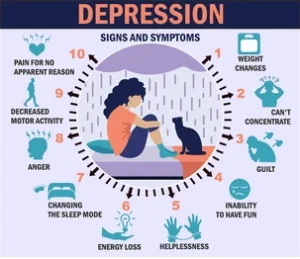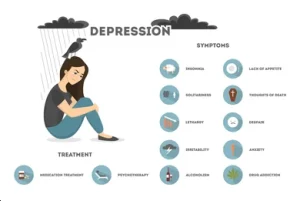What is Depression?
Depression is a common mental disorder in which individuals feel sadness or low mood and loss of interest in daily activities that they enjoyed before.
If the symptoms remain persistent it’s called clinical depression or major depression. If you or your loved one experiences depression the first step is to take the initiative and consult mental health professionals.

What are the symptoms of Clinical depression:
Three main types of depressive disorder symptoms:
- Physical
- Psychological
- Social
Physical symptoms
Physical symptoms of depression include:
- Headache
- Muscles aches or pain
- Fatigue
- Low appetite
- Constipation
- Insomnia or hypersomnia
Psychological:
Psychological symptoms of depression include:
- Persistent sadness or low mood
- Anhedonia or loss of interest
- A feeling of worthlessness and hopelessness
- Having suicidal thoughts or ideation
- The feeling of guilt or shame
- Low self-esteem
- Poor decision making
- Crying
- Weeping
Social symptoms:
Social symptoms of depression include:
- Withdraw from social events or gatherings
- Having problems in daily life activities, institutions, or public places
- Loss of interest or participation in the hobbies you enjoyed before

Causes of Depression:
There are many causes of depression.
- Biological
- Genetics
- Environmental
- Psychological
How to manage clinical depression:
The first step is to realize that you are not mentally fit and that you need the help of a mental health professional.
Never think about the stigma of mental health because you need help right away, or it will only get worse.
In our society, people avoid seeking professional help due to many stigmas and taboos. Eventually, they face so many difficulties in their daily lives that they become dangerous to everyone and start harming themselves.
Depression Management:
- Medications
- Psychotherapies
- Lifestyle changes
Medications
Various forms of mood stabilizers, anti-depressants, and anti-anxiety medications are prescribed by psychiatrists to balance neurotransmitters, which help manage mood swings and relieve patients’ symptoms.
- Psychotherapies:
Clinical depression is treated with a variety of therapy. Psychologists apply it by the patient’s state and severity. It assists in modifying the patients’ behavioral patterns, thoughts, and emotions. It is crucial when using medication since while pills only provide momentary relief, therapies offer long-lasting relief.
Cognitive Behavioral Therapy, Dialectical Behavior Therapy, and Humanistic Therapy are the most important therapies for depression.
- Life Style Changes:
- Healthy diet
- Yoga
- Meditations
- Exercise
- Swimming
- Avoid caffeine, smoking, and alcohol
- Have enough sleep
- Enjoy quality time with friends


It is very important topic, you describe very well in this blog.
Can You give me a session on how to manage depression?
Yes you can contact me for session and written Content.